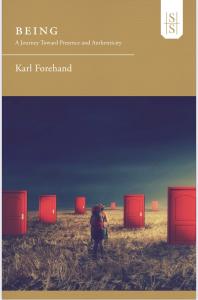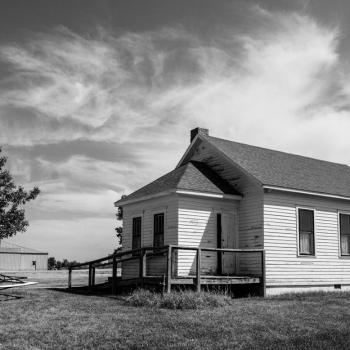
(an exert from my book, Being: A Journey Toward Presence and Authenticity)
In our communities, we want people who will identify with us and sometimes even advocate for us. Occasionally, we hope they will encourage us when we are down and give us some well-timed advice when we are messing up. We want to feel like we are cared for. When we are tired, we hope someone will carry the ball—when we are motivated, we like to have someone that we can give ourselves to. In short, we want someone to love and someone that loves us. We hope this is not just because we are a part of their community, but because they freely choose to do so. As I said before, this community can come from a variety of sources. It doesn’t have to be just at church or just in our families or just in a club. It can come from all those places and more; but what we really want is connection, not just community.
Maybe the deepest connection we desire is connection to the Divine. No matter whether we call this God or Creator or Source or something else, this desire to understand and connect with a greater power is something that also seems to be designed into us. Most cultures and peoples from all over the world demonstrate this quest that seems to be a part of them regardless of their history—we seem to be searching to understand and connect with whoever or whatever is calling the shots. Some of us even substitute relationships with powerful or influential people thinking this connection will bring us happiness or success or whatever we are striving for.
This was the nature of my recent struggle. I was trying to connect with the more famous people to give me some credibility or validity to my existence in some way. It’s almost subconscious, but I often long to do something significant and I hope to be on the right team. It goes way back in my history and my Spiritual Director helped me visit this part of me the other day and find some resolution. I assume this quest for validation relates somehow to my desire to connect with God.
Connecting with God was complicated in the tradition I grew up in. God was always believed to be way out there somewhere. Since God randomly distributed gifts at whim, it was hard to know what He expected because He was also depicted as a retributive Father that was constantly angry. We would gather in prayer circles and “petition” him for things that most fathers would be glad to bestow on their children. We begged Him for grace and mercy even though the writings about him said He was full of these things.
I must admit, I connected with some people easier at the bar than I was able to connect to “God’s people” in “His house.” I was able to relate to a wide variety of people in various areas of life but connecting with this God that supposedly loved me seemed elusive and sometimes disheartening. This was made worse by the promises of religious people that this was my most important relationship. Even as a pastor, I felt like I consistently failed to connect with the being that supposedly loves me with all His heart.
What my tradition did not understand or affirm is that God (we’ll just use that label for now) is everywhere. Even though the Bible mentions this fact more than once, most groups choose which parts of Scripture to accept and which to ignore. Most traditions pick and choose which parts they will be literal about and which ones they will skip over. When I was in Seminary, they told me that “where you begin is where you end up.” Basically, it means that the assumptions we start with when studying anything will greatly influence how we understand it.
Another factor that is like that is the idea that God is in us and, possibly, that God is in all things. This also could be asserted just from a few passages in the New Testament of the Bible. Many world religions believe this also. God is everywhere, because He is Spirit, but he is also in us and in all things. Why would He be everywhere and exclude Himself from the creatures He loves? Along with these ideas, we would naturally assume that if His main attribute is love, He would want to be with those He loves, and He wouldn’t hide from those that He cares about. This pandemic has taught us that even humans long to be with the people they love, so why wouldn’t His Spirit be in us if that was a possibility. Why would He hide from us – that’s not a very good Father.
I now believe this to be true. I believe the Divine is everywhere and, in all things, and the way of connection for us is to go within. In the Cloud of Unknowing, the author states, “we can’t think our way to God.”[1] That’s why we’ve had so much trouble connecting to God. Religious people have tried to imagine God who cannot be adequately imagined. If God is love, we must experience the Divine through things like love and compassion and not through our thinking. When we go inside, we can experience everything that God is through sensations, feelings, emotions and listening. You don’t really experience a lover by intellectually analyzing them – we know them when we draw close. I don’t think we experience God when we think—it’s more like we experience Him when we quit thinking and just love.
When we connect with the Divine internally, we find a peace that is hard to explain. We find understanding not through knowledge but through uncertainty. We feel love because we experience it deep within us not when we intellectually can articulate it. We learn to trust something that we cannot explain. I am less able to explain God than I could 20 years ago, but I have experienced Him more deeply than I ever could have imagined. I don’t use my intellect to spiritually bypass anymore, but I dive deep into the depths of his love and I perceive Him there. I feel it—I know it—and it heals me from deep inside.
In a previous book, I talked about going into a wooded area and sitting in a clove of trees. After quieting myself and playing some Native American music, I heard and understood the words, “I am a part of this, and this is a part of me.” The words connected deeply with where I was mentally and emotionally at the time. It also resonated with my identification with my Native American roots. But the words were not vocal. I didn’t even really hear the words—I felt them. It wasn’t a matter of logic or reasoning. My mind was not speaking or even hearing the words. My body and soul were feeling it. It’s almost as if something ancient came alive inside me. But it didn’t float down or blow into me—it seemed like it has always been there. It was more of an awakening and awareness than an invasion. It wasn’t hard to welcome this thought because it seemed like it belonged.
That is what my experiences with God are like these days. Every morning and sometimes late at night, I sit in my recliner and meditate for lack of a better word. As I begin to release all the thoughts of the day, I also begin to release my expectations. I would describe it more as a sense of being than doing. Thoughts are when the mind is speaking, but true communion is when the mind is only listening with a simple intention to be and be with the Divine. It is almost like the times when I held Laura’s hand and neither of us spoke; but as we were together, we felt as if our hearts were beating together. When I am present with the Divine, I feel many of the things I thought to be true – I feel love and grace and compassion deep within me. It’s not that I understand these things better; but I feel them somewhere deep inside me.
Being with the Divine may be less like taking a class and more like taking a break. It is certainly learning to be still and go within without any intentions or expectations. It’s not an emotional high that fades away, it is something I experience that was already a part of me. It’s less like taking a trip and more like coming home. Being with the Divine in me is loving in its truest sense. I feel the compassion, mercy and grace deeply – it changes me from within.
Being where I am means being where God already is. Being who I am is recognizing that I already possess this love and I become what I have always been—a unique imprint of the Divine.
Be where you are, be who you are,
Karl Forehand
[1] Butcher, Carmen Acevedo, The Cloud of Unknowing: A New Translation,
Leaning Forward Video Recordings 2021













